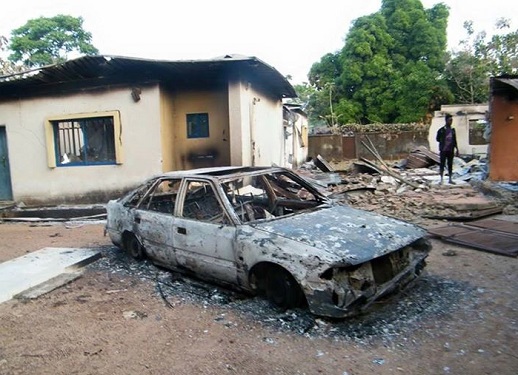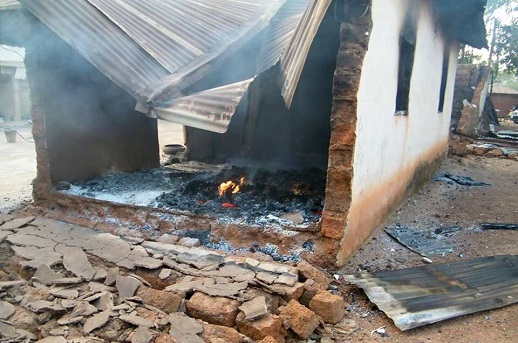
of Goska, houses were destroyed, churches burnt and shops vandalised in a December attack.World Watch Monitor
The two Nigerian villages are barely five minutes’ drive apart. In one, Goska, houses were destroyed, churches burnt, shops vandalised, carcasses of animals littered the streets and most of the village remains deserted. The other, Dangoma, remains intact, untouched by the shadows of violence.
Goska and Dangoma both lie in the Jema’a area of southern Kaduna in Nigeria’s Middle Belt; however, Goska is an indigenous community that is predominantly Christian, while Dangoma is a settler community, mostly Fulani and Muslim.
A Goska resident confirmed the attack in December to a researcher for World Watch Monitor (listen below).
There seems to be a worrying pattern. The contrast between Goska and Dangoma after last December’s attack “is a metaphor for the violent conflict in southern Kaduna,” a researcher in Nigeria, who did not wish to be named, told World Watch Monitor.
Similar violent conflicts are affecting many other local communities across Kaduna State, and most are deliberate, well organised and executed, he added.
The selective nature of the conflict can be seen in the way individuals and families, towns, properties and communities are targeted: where indigenous Christians and settler Fulani Muslims live side by side, Christian homes are attacked while Fulani Muslim settlers are left alone.
Many experts now believe that this Middle Belt violence is responsible for more deaths than Boko Haram, which in 2016 experienced both internal splits and external military defeats by the Nigerian Army.
In response, the local and federal governments have launched a range of military initiatives, while a local Catholic diocese is embarking on the painstaking work of dialogue and reconciliation.
Following an attack on the convoy of the Kaduna Governor, Nasir Ahmad el-Rufai, in December, a 24-hour curfew was declared in three Local Government Areas, empowering the security forces to protect lives and property, as World Watch Monitor reported. It has since been scaled back to a 12-hour period (6pm-6am) and covers just one area, and the state government has introduced measures to forestall any future violence.
Meanwhile the federal government ordered the Nigerian Army to establish a base in southern Kaduna. The chief of Army Staff, Lt. General Tukur Buratai, gave assurances to local leaders that the army was there not to take sides but to restore peace.
As part of the peace measures, the federal government has also given approval for the building of another military barracks in southern Kaduna, in Kafanchan in the Jema’a area.
In the diocese of Kafanchan, the Catholic Church says that over 800 died between 2011 and the end of 2016. Many groups and individuals, including Peter Bawa, the Chairman of the Northern Christian Youth Assembly, have commended Governor El-Rufai for initiatives taken so far, believing that they will go a long way to curtail the menace of herdsmen who have plunged many communities in the area into mourning.
However, some of southern Kaduna’s indigenous population interviewed by World Watch Monitor felt the government was militarising the conflict. Military force is sometimes used in conflict as the first and not the last resort, often without civilian engagement.
For instance, according to Environmental Rights Action of Nigeria in its book Blanket of Silence: Images of the Odi Genocide, then-President Obasanjo responded to the 1999 civil unrest in the town of Odi in Bayelsa State by sending in “27 five-ton vehicles loaded with over 2,000 troops, four armoured personnel carriers … three 81mm mortar guns and two pieces of 105mm Howitzer Artillery guns, and they killed a total of 2,483 people”.

mainly deserted after the attack in December.
World Watch Monitor
The violent activities of Boko Haram since 2009 were also followed by the deployment of the military, a civilian joint-task force, various local vigilantes, and hunters. Yet the conflict has escalated and not ended. Sending military to southern Kaduna may not provide a solution.
Other critics have faulted the government for positioning the new barracks in Kafanchan, where so much bloodshed has occurred, saying they suspect the Kafanchan base is meant to protect a “settler” chief, who is not accepted by the indigenous people.
Locals told World Watch Monitor that there is a cry for the building of genuine community engagement, and against policies that enhance social exclusion, marginalisation and injustice, and for dealing with these. It is important, say those involved, to give victims, women and children a voice, otherwise the conflict is only suspended, not ended.
In response to all this, the Kukah Centre, a mediating institution set up by the Catholic Bishop of Sokoto, Matthew Hassaan Kukah, has initiated a project on Memory and Healing in Southern Kaduna. The centre is committed to promoting shared national identity and citizenship as a bedrock for healing, peace and stability in southern Kaduna, and to that end is documenting victims’ memories of the conflict. Using inter-group dialogue and community engagement, it provides a platform for victims and ordinary people to be heard.
Some activities to begin next month include a high-level consultation with the Kaduna government, supported by the independently-run National Peace Committee. The centre is also planning 10 community engagements in four Local Government Areas badly affected by the conflict: Sanga, Jama’a, Kauru and Kaura. The groups of participants will cut across socio-cultural, religious and political divides.
Additionally, victims will be enabled to recount their stories in 10 focus-group discussions and five roundtable conversations with organisations such as Southern Kaduna’s Women’s and Youth Forums, Jamaatul Nasri Islma, Miyetti Allah Cattle Breeders’ Association of Nigeria, Muslim Youth Forum of Southern Kaduna, Southern Kaduna Peoples Union and Young Professionals Forum.
The Kukah Centre is also planning to build memorials for victims of the conflict.
Achieving an end to the conflict has benefits beyond the humanitarian goal of ending the spectre of burnt-out homes and animal carcasses rotting in destroyed villages. Last year, the aid agency Mercy Corps said that if peace came to just four Middle Belt states – Kaduna, Benue, Nasarawa and Plateau – Nigeria would stand to gain up to US $13.7 billion annually in total economic progress.